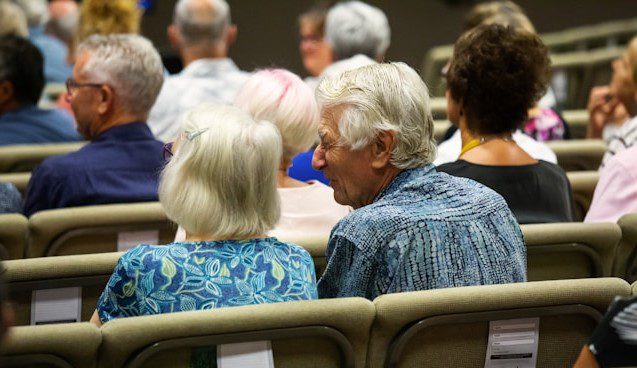Do Senior Living Places Meet Hard-of-Hearing Communication Needs?

Be sure to be included – not excluded – in your new “home.” Find out about hearing loss accommodation before signing contracts. As people age, their chances for hearing loss increase along with their risk for dementia. It is said that 55 % of those aged 75 and older have disabling hearing loss. They struggle to hear and understand speech in background noise. This makes communication and participation in Senior Living settings difficult, if not impossible. Sadly, hearing aids also have their limitations in loud places.
Senior Living facilities cater to older adults. As there is a link between hearing loss and dementia, it makes sense that meeting hard-of-hearing communication needs should be a major selling point. But what is actually provided for the customer? We have to find out!
Access to communication for participation!
Websites and brochures highlight efforts for maintaining mental health. People belong to a community and make new friends. Physical exercise, learning activities and on-site worship opportunities combat the dreaded depression and isolation. Community get-togethers for games, entertainment and fun keep residents socially engaged.
However, it will be difficult at best for hard-of-hearing people to participate in “Activities” that are held in lounges and dining rooms that lack adequate Access to Communication. What basic information do websites actually post regarding Disability and Accessibility? Trying to contact facilities by phone or email can be quite frustrating, as I found out.
Hard-of-hearing and going for a tour?
Inquire about access. See for yourself. Do guides and staff members know the basics of how to communicate with those with hearing loss? Do they face the person and speak calmly but distinctly? Do they relocate to a quieter place when discussing details?
“Tour” guides often belong to the marketing/leasing departments. However, the property/building/facility manager may be a better resource for Access information. What kind of hearing accommodation does the facility offer?
Public Address (PA) systems tend to be favorites. I was told that they are easy to use and have plenty of volume. However, overly amplified PA systems can cause sound distortion and echoing, which complicate hearing issues even more. How about Hearing loops, FM or IR? Are neckloops available for compatibility with T-coil equipped hearing aids? If the guide does not know what any of this means, chances are that hearing accommodation might be minimal at best.
Also, if systems are in place, who oversees their operation and maintenance? The fact that a system is installed does not mean that it works or that staff are trained in its use.
No movie or Bingo for you?
Don’t be taken by surprise. It is not a given that Senior Living places meet the communication needs of the hard-of-hearing. It is very depressing to have bought into a cooperative or to have signed leasing contracts only to find out that the facility lacks reasonable access for hard-of-hearing residents. However, if life is to be lived to the fullest, now is not the time to miss out.